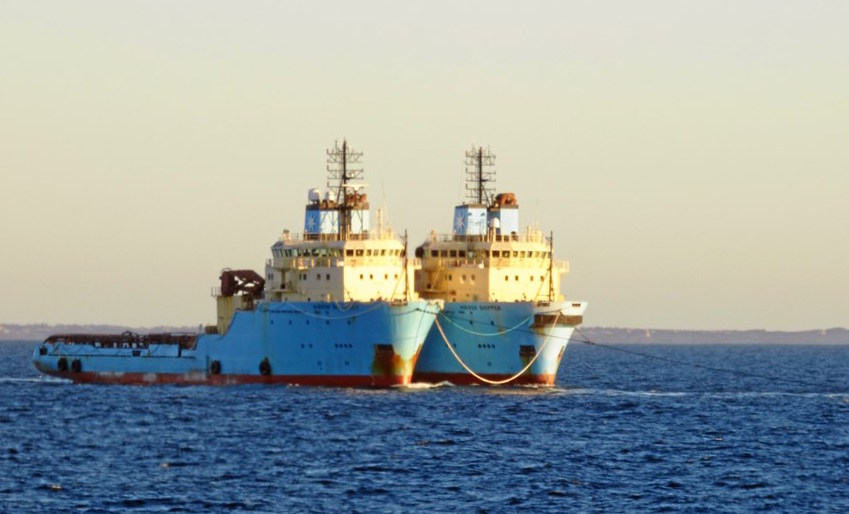⇒ On December 19, 2016, the European Union published its first list of approved ship recycling facilities.
– Germany keeps its hands clean. In the North Sea or the Baltic Sea, it does not offer any scrapping site for its fishing fleet, Navy vessels and container ships. It exports the sea waste to Turkey, India, Bangladesh and a bit in the Baltic States.
– Around the Mediterranean basin, along the Adriatic and the Black Sea shores , there is to date no approved facility in the EU Member States. This is a serious gap which deprives the Western Mediterranean and adjacent seas of reliable and autonomous means to destroy substandard ships or ships detained in ports for technical, social and judicial reasons. This is a serious gap which does not encourage the disposal of old ships possibly involved in human trafficking. It favours the Turkish connection which is practicing some kind of beaching like India, Bangladesh and Pakistan. Italy has not benefitted from its feedback from the grounding, re-floating and dismantling of the Costa Concordia and from the scrapping of vessels involved in migrant trafficking in the ports of Augusta, Reggio Calabria, Corigliano, Catania or Gallipoli.
⇒ The Bow Eagle was scrapped in India. On August 26, 2002, the chemical tanker was guilty of hit and run off Brittany after a night collision with the Cistude, a French trawler from Les Sables d’Olonne. 4 crewmen were reported missing. The trial of the Filipino look-out officer took place in Norway. He was condemned to 5 years in jail. The delocalisation of the trial paved the way to the doctrine that crimes and offences at sea should be judged by the flag State. Ironically, the owner of the ex-Bow Eagle earned a lot of money thanks to the ship’s stainless steel tanks. She was purchased by an Indian breaker for a record price of 507 US$ per ton.
⇒ The fire and explosion aboard the Aces ex Federal 1 (28 fatalities on November 1) on the beaches of Gadani in Pakistan exposed the hidden face of ship demolition in Asia. At the time of her beaching, the tanker contained 30,000 tons of various hydrocarbons which were to be re-used within the country. The preliminary inquiry talks about “smuggling”. The old tanker came under tow from Indonesia. On the beach at the time of the explosion, there were old hulls flying the flags of Germany, Malta, Norway, Portugal and the United Kingdom.
⇒ From October to December 2016, 203 ships were demolished in the Indian subcontinent, China and Turkey. Of these 203 ships, 81 were built in Europe and 93 were owned by shipowners established in the EU or in the European Economic Area. The ships made in EU in the decade 85-95 and containing asbestos, PCB, lead and tin paint keep on being destroyed in Asia for profit.
From a financial point of view, the parallel between the demolition of the Jeanne d’Arc and the cruiser Colbert in Bordeaux, France, and the demolition of the aircraft carrier HMS Illustrious in Turkey is striking:
| 19,000 tons: for the dismantling of the two hulls, the French Navy paid 11.5 million euros to the demolition site of Bordeaux, a cost of 648 US$ per ton.
12,500 t: for the dismantling of the aircraft carrier HMS Illustrious, the Royal Navy received £ 2.1 million from the Turkish shipbeaking yard, a profit of 210 US$ per ton. |
⇒ Denmark-based Maersk Group, the world’s leading ship-owner, shows the wrong track. In December, three of its offshore supply vessels in the North Sea left for Turkey to be demolished. This incredible convoy, one towing the other two side by side, got into trouble off Brittany. The Maersk Shipper and Maersk Searcher sank. These shipwrecks could have been avoided if Maersk had sent its end-of-life ships to local yards. This kind of staggering towage is unfortunately frequent in the small world of ship demolition. The Rio Tagus, stuck at the French port of Sète since 2010 is waiting to be towed towards a Spanish demolition site not approved by the European Union instead of being destroyed on the spot in a temporary facility supervised by the French authorities as permitted by the EU in case of need.
 Maersk Shipper et Maersk Searcher sank off Brittany, France, on December 22, 2016
Maersk Shipper et Maersk Searcher sank off Brittany, France, on December 22, 2016
© Inspektionsskibet Vestkysten
⇒ Demolition market leaders are still India, Bangladesh and Pakistan.
“Shipbreaking” #46
83 pages, pdf – 14 Mo
 Imprimer cet article
Imprimer cet article









